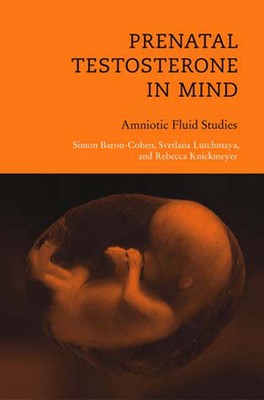
- We will send in 10–14 business days.
- Author: Simon Baron-Cohen
- Publisher: MIT Press
- ISBN-10: 0262524562
- ISBN-13: 9780262524568
- Format: 12.8 x 19.6 x 1.1 cm, minkšti viršeliai
- Language: English
- SAVE -10% with code: EXTRA
Reviews
Description
This pioneering study looks at the effects of prenatal testosterone on postnatal development and behavior. Hormonal effects on behavior have long been studied in animals; the unique contribution of this book is to suggest a connection between human fetal hormones and later behavior. It details for the first time testosterone's effect on social and language development, opening a new avenue of research for cognitive neuroscience.
The authors look at samples of amniotic fluid taken during amniocentesis at 16 weeks' gestation, and relate the fetal level of testosterone (which is present in fetuses of both sexes, although in different quantities) to behavior at ages 1, 2, and 4 years. They argue that the amniotic fluid provides a window into the child's past--a chemical record of that child's time in the womb--that allows informed prediction about the child's future brain, mind, and behavior. This is not the retrospective speculation of psychoanalysis, they point out, but an opportunity to study development prospectively and trace developmental precursors and causes of later cognition.
The study suggests that prenatal levels of testosterone affect a range of later behaviors in children, from the inclination to make eye contact with others to the size of the vocabulary. It also suggests that prenatal testosterone level may be related to the development of typically "masculine" and "feminine" behaviors. The study's ongoing research explores whether fetal testosterone has any link with the risk of developing autism. Connecting endocrinology and psychology, the authors propose that there is a biological component to behaviors often thought to be produced by the social environment.
EXTRA 10 % discount with code: EXTRA
The promotion ends in 22d.18:11:08
The discount code is valid when purchasing from 10 €. Discounts do not stack.
- Author: Simon Baron-Cohen
- Publisher: MIT Press
- ISBN-10: 0262524562
- ISBN-13: 9780262524568
- Format: 12.8 x 19.6 x 1.1 cm, minkšti viršeliai
- Language: English English
This pioneering study looks at the effects of prenatal testosterone on postnatal development and behavior. Hormonal effects on behavior have long been studied in animals; the unique contribution of this book is to suggest a connection between human fetal hormones and later behavior. It details for the first time testosterone's effect on social and language development, opening a new avenue of research for cognitive neuroscience.
The authors look at samples of amniotic fluid taken during amniocentesis at 16 weeks' gestation, and relate the fetal level of testosterone (which is present in fetuses of both sexes, although in different quantities) to behavior at ages 1, 2, and 4 years. They argue that the amniotic fluid provides a window into the child's past--a chemical record of that child's time in the womb--that allows informed prediction about the child's future brain, mind, and behavior. This is not the retrospective speculation of psychoanalysis, they point out, but an opportunity to study development prospectively and trace developmental precursors and causes of later cognition.
The study suggests that prenatal levels of testosterone affect a range of later behaviors in children, from the inclination to make eye contact with others to the size of the vocabulary. It also suggests that prenatal testosterone level may be related to the development of typically "masculine" and "feminine" behaviors. The study's ongoing research explores whether fetal testosterone has any link with the risk of developing autism. Connecting endocrinology and psychology, the authors propose that there is a biological component to behaviors often thought to be produced by the social environment.


Reviews